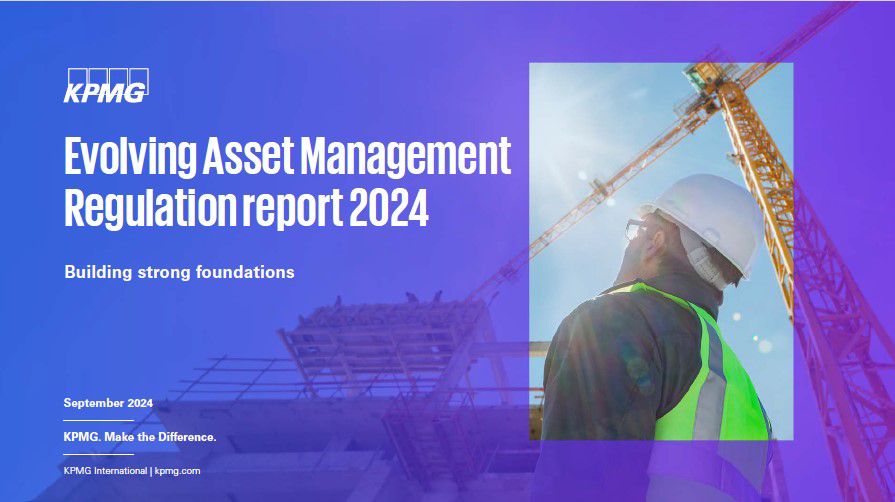Asset management regulation is constantly evolving. KPMG’s Evolving Asset Management Regulation report explores a broad range of regulatory priorities, developments and proposals affecting the asset management industry around the world.
As this year’s report – our 14th edition – finds, after four years of rapid-fire regulatory development, many regulators are now taking stock and shifting efforts from policymaking to supervision. Embeddedness is being assessed. Compliance is being checked. Guidelines are being published. And rules are being updated and amended to reflect asset managers’ feedback and real-life experience. Asset managers should proactively seize this window of opportunity to build strong foundations for regulatory compliance going forward.
While the pace of new regulation may have slowed slightly, this year’s report identifies several key topics and focus areas that are rapidly changing — often in diverging ways depending on the market and the regulator’s stance.
Report overview:
Regulators remain highly focused on anti-greenwashing measures in the asset management sector. This year’s report notes that a number of jurisdictions are introducing sustainability-related product labels, enhancing the scope of disclosures, and creating rules to ensure that fund naming and marketing is not misleading. Asset managers should seek to stay abreast of changing regulatory requirements.
Action: Assess your global product strategy and your approach to ESG governance to ensure alignment with relevant regulatory anti-greenwashing frameworks and controls. Consider implementing a common framework across your firm to define which products qualify as ‘sustainable’.
The regulation of AI and digital technology is front and center with regulators around the world taking different approaches and moving at different paces – creating challenges for global asset managers seeking to drive performance improvements with new technology. This year’s report also notes efforts in some markets to clarify whether retail funds should be able to invest in crypto assets.
Action: Keep on top of regulatory changes and ensure the latest communications and expectations are factored into your business strategy and your product manufacturing and approval processes. Assess whether your risk and compliance function is ready for the changes being rolled out.
With some standards now set around open-ended fund liquidity practices and money market fund stability risks, regulators are shifting their focus to leverage and increasing transparency through the introduction of new reporting requirements for funds. As assets under management continue to grow, expect supervisors to start to question whether their regulatory frameworks remain appropriate.
Action: Consider how private assets can be brought into the corporate strategy and identify and address any potential conflicts of interest that might arise. Review the governance arrangements and policies and procedures underpinning fund liquidity risk management.
Financial resilience requirements are being updated and enforced. Implementation deadlines for operational resilience requirements are approaching rapidly. Cyber resilience remains firmly in the regulatory crosshairs. And AML and CFT regulations and requirements are being tightened. Given recent economic uncertainty, it is not surprising that resilience is near the top of the regulatory agenda.
Action: Build a culture of financial and operational resilience within the board, supported by defined tolerances for disruption. Assess third party and outsourcing arrangements with a particular focus on cyber-related risks.
Regulators are strengthening consumer protection frameworks, updating disclosure requirements, tightening product governance arrangements, and checking the embeddedness of existing rules. At the same time, they are also taking a close look at the value of investment products and services to ensure investors are getting the service they are paying for.
Action: Review your firm’s strategy, governance structures, culture, and purpose to ensure it is aligned with customers’ best interests. Ensure services are being delivered where clients have paid for them and perform an assessment of the benefits and costs to assess value for money.
While good governance always plays a role in regulation, there are specific areas where regulators are focusing more recently. Accountability frameworks are being updated. New investor protection rules are being published. Delegation of portfolio management rules have been finalized in Europe. And reviews of frameworks that govern asset managers' stewardship of investee companies are underway.
Action: Assess board composition to ensure individuals have the capacity and capability to provide sufficient knowledge, expertise, and independent challenge. Evaluate current governance frameworks and accountabilities against regulators’ expectations as they evolve.
As policymakers look to promote their own asset management and capital market industries, authorities are looking to broaden the range of investments available to investors in their markets. They are also seeking to create opportunities for fund management companies to bring new products to market to better meet investor demand. Regulation isn’t just about risk; it’s also about opportunity.
Action: Identify potential opportunities to bring new products to market or grow market share in key geographies. Assess your ability to distribute funds and services cross-border. And check that appropriate investor protection measures have been embedded in product design.
Regulatory change management is evolving from a compliance challenge into a strategic data and workflow opportunity. And regulatory compliance is increasingly being driven and evidenced by digitalized, centralized end-to-end obligation capture and mapping. Asset managers are enhancing their approach to compliance to become more efficient and effective.
Action: Adopt regulatory horizon scanning technologies with the aim of staying on top of regulatory changes. Automate appropriate processes to improve operational efficiency, oversight, and traceability. And standardize data collection and assessment to streamline risk and control frameworks.
How KPMG can help
KPMG’s global network of asset management and sustainable finance professionals can help organizations turn regulatory change into growth opportunity.
KPMG professionals take a holistic view of regulation related to your business, integrating viewpoints gained from working with investors, managers, regulators and service providers to help clients make informed decisions that can help drive their business forward in times of uncertainty.
Methodology
About the KPMG 2024 Evolving Asset Management Regulation Report
The 14th edition of KPMG’s annual flagship Evolving Asset Management Regulation report brings together a broad-ranging picture of regulatory priorities, developments and proposals impacting the asset management industry around the world since last year’s report.
Drawing on the KPMG Regulatory Horizon tool and the insights of KPMG specialists, we considered regulators’ publications from global and regional standard setters and almost 30 countries and territories around the world, capturing and prioritizing over 200 individual regulatory developments or publications that form the basis of this report. These developments were collated into seven regulatory themes, representing challenges that affect all types and aspects of asset management businesses as well as market opportunities. In addition, by drawing on the insights and knowledge of KPMG specialists we have explored how asset managers can best approach the topic of regulatory change to keep pace with regulators’ evolving expectations.
At the end of each chapter, we have outlined proactive actions that asset managers can take to respond to the identified regulatory developments, based on KPMG specialists’ insights and preferred practice.
Throughout this webpage, “we”, “KPMG”, “us” and “our” refers to the global organization or to one or more of the member firms of KPMG International Limited (“KPMG International”), each of which is a separate legal entity.
KPMG International Limited is a private English company limited by guarantee and does not provide services to clients. No member firm has any authority to obligate or bind KPMG International or any other member firm vis-à-vis third parties, nor does KPMG International have any such authority to obligate or bind any member firm.
Talk to our Asset Management experts
Connect with us
- Find office locations kpmg.findOfficeLocations
- kpmg.emailUs
- Social media @ KPMG kpmg.socialMedia
Stay up to date with what matters to you
Gain access to personalized content based on your interests by signing up today


